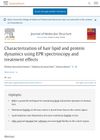Search
for
Sort by
Research
630-660 / 704 results
research Characterization of Hair Lipid and Protein Dynamics Using EPR Spectroscopy and Treatment Effects
Hair treatments and dehydration affect hair's lipid and protein behavior, influencing its flexibility and appearance.

research Genetics and Epigenetics of Polycystic Ovary Syndrome
Genes and epigenetic changes are important in the development of Polycystic Ovary Syndrome.

research Comparative Effects of Finasteride and Minoxidil on Male Reproductive Organs: A Systematic Review of In Vitro and In Vivo Evidence
Finasteride is more harmful to male reproductive health than minoxidil.

research Study of Drug Target Identification and Associated Molecular Mechanisms for the Therapeutic Activity and Hair Follicle Induction of Two Ashwagandha Extracts Having Differential Withanolide Constitutions
One Ashwagandha extract may help protect cells with its antioxidant properties, while another could promote hair growth.

research Follicle-Targeted Delivery of Betamethasone and Minoxidil Co-Entrapped in Polymeric and Lipid Nanoparticles for Topical Alopecia Areata Treatment
Tiny particles improved delivery of hair loss treatments to hair follicles, with lipid-based particles performing best.

research Efficacy and Safety of Combinational Therapy Using Topical Minoxidil and Microneedling for the Treatment of Androgenetic Alopecia: A Systematic Review and Meta-Analysis
Using minoxidil with microneedling increases hair count for hair loss without serious side effects.

research Diagnosis And Management Of Alopecia Areata: A Saudi Expert Consensus Statement (2023)
Experts recommend personalized treatment plans for best outcomes in managing Alopecia Areata.

research The Impact of Gender Affirming Hormone Therapy on Physical Performance
Gender-affirming hormone therapy improves physical performance in trans men to the level of cisgender men, while in trans women, it increases fat mass and decreases muscle mass, with no advantage in physical performance after 2 years.

research Growth Factor Cocktail Including Fibroblast Growth Factor 9 in the Treatment of Androgenetic Alopecia in Men and Women: A Randomized Controlled Trial
Cellcurin therapy with microneedling increases hair density and thickness in treating hair loss in men and women.

research Oxidative Stress: Insights into the Pathogenesis and Treatment of Alopecia
Hair loss can be caused by stress, aging, and harmful substances that create an imbalance in the body's natural processes.

research A Systematic Review on Traditional Use, Phytochemical and Pharmacological Properties of Medicinal Plants in Kurdistan, Iraq
Medicinal plants in Kurdistan have potential health benefits and need more research for drug development.

research Alopecia Areata in Latin America: Where Are We and Where Are We Going?
Alopecia areata needs more recognition and better treatment access in Latin America to improve patient care and outcomes.

research Long-Term Prophylaxis With Androgens in the Management of Hereditary Angioedema in Emerging Countries
Long-term use of androgens can help manage Hereditary Angioedema (HAE) but may cause serious side effects, so alternative treatments with fewer side effects are being considered.
research Areata-Like Lupus as a Clinical Manifestation of Cutaneous Lupus Erythematosus
Areata-like lupus can mimic alopecia areata but is a form of cutaneous lupus erythematosus.

research Influence of Dysbiosis on Scalp Pathology
Imbalance in scalp bacteria can affect hair and scalp health, potentially leading to conditions like hair loss, psoriasis, and dandruff.

research Effective Treatment of Alopecia Universalis with Oral Tofacitinib: A Case Report
Oral tofacitinib successfully treated total body hair loss in one patient.

research Mutamba Fruits (Guazuma Ulmifolia Lam.) - Physical, Physicochemical, and Antioxidant Characterization
Mutamba fruits are rich in soluble solids, vitamin C, and minerals, making them good for food industry use.
research Hair Botox: Regain Your Healthy Hair
Hair Botox makes hair look healthier and fuller.
research Physiology of Male Gonadotropic Axis and Disorders of Sex Development
Understanding genes and hormones is crucial for managing male puberty and sex development disorders.

research Update on Polycystic Ovary Syndrome
Polycystic Ovary Syndrome (PCOS) affects 6%-15% of women of reproductive age, causing symptoms like acne and hair loss, and increasing the risk of type 2 diabetes and heart disease; it's managed through diet, exercise, and medications like Metformin and hormonal contraceptives.

research Marking the Recipient Sites in Hair Restoration Surgery: New Methodology to Attain Symmetric Density
A new method using gentian violet and a protective spray can improve symmetry and reduce surgery time in hair restoration, but it's only effective for total hair loss, not diffuse hair loss or follow-up treatments.
research Follicular Unit Extraction Method of Hair Transplantation: Technique, Advantages and Limitations
The follicular unit extraction method for hair transplants is a technique with benefits and drawbacks.
research Platelet-Rich Plasma (PRP) as a New Approach and Promising Therapy in Patients With Alopecia Areata
PRP is a safe and effective treatment for hair growth in alopecia areata.
research Finasteride
research Development of the Emulsion for the Androgenic Alopecia Treatment
The emulgel with specific ingredients was effective for treating hair loss.
research One Year Cross-Sectional Study of Association Between Androgenetic Alopecia and Benign Prostatic Hyperplasia in a Tertiary Care Hospital
There is no link between hair loss and prostate enlargement.
research Tamoxifen-Induced Androgenetic Alopecia in a Dialysis Patient with Sclerosing Encapsulating Peritonitis

research Formulation of Hair Tonic from Ethanol Extract, Ethanol Fraction, and Chloroform-Methanol Fraction of Secang Wood (Caesalpinia sappan L.)
Secang wood extract hair tonic promotes hair growth and meets quality standards.

research The Annual Changes of Clinical Manifestation of Androgenetic Alopecia Clinic in Korean Males and Females: An Outpatient-Based Study
AGA increased yearly, type I most common, and family history and seborrheic dermatitis often linked.